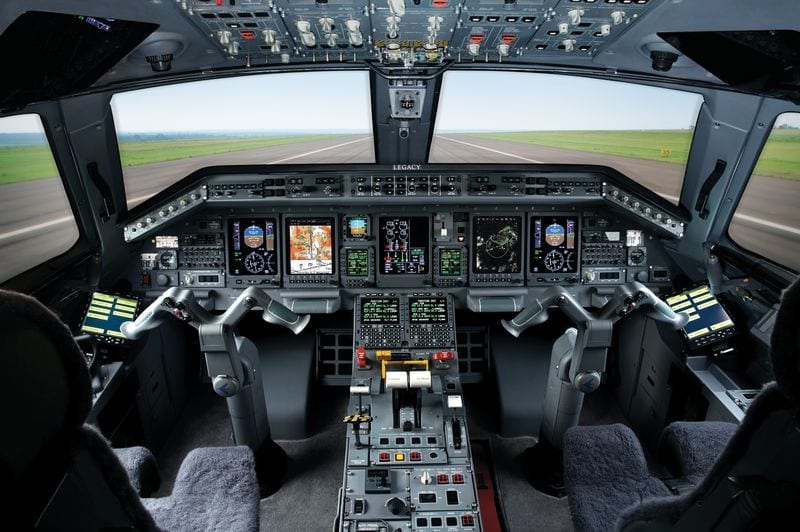
Business aviation OEMs are adapting to the COVID-19 pandemic. Embraer, for example, is making ventilator parts, while Honeywell is producing N95 masks. Pictured here is the flight deck of an Embraer Legacy 650, which features a Honeywell Primus Elite avionics suite. Photo: Embraer
Business aviation OEMs in the United States are looking to the Coronavirus Aid, Relief, and Economic Security Act (CARES Act), P.L. 116-136, to help sustain their suppliers, including avionics makers and small businesses. The CARES Act became law on March 27.
“One thing that I found in talking to virtually all the OEMs over the last few weeks is that they know how to manage their companies and their operations, but their big concern – and I think you find this even on the commercial manufacturers’ side whether it’s Boeing or Airbus – is that they’re very concerned about the supply base, and that they want to direct as much help as they can down to that supply base because that’s their life blood,” Pete Bunce, the president of the General Aviation Manufacturers Association (GAMA), said during an Aviation International News webinar on Apr. 7 on the impact of the COVID-19 pandemic on business aviation and prospects for recovery.
“Being able to provide them [OEMs] tools on how to access the assistance that’s available through the CARES Act has been a primary focus,” Bunce said. “We have told [Capitol] Hill, and the Hill has responded with some very good information on how the legislation was crafted to be able to go ahead and allow businesses to say, ‘Ok. That’s how I do it.’ There’s a delay in the [CARES Act] implementing procedures, but we hope that that money will be flowing very soon, and we think that will be very vital to keep that supplier base vibrant during this period of time until we can get [business jet] production going again.”
GAMA pointed to paycheck protection loans available to small businesses for job retention and other expenses.
The CARES Act provides up to $25 billion for U.S.-based passenger air carriers, $4 billion for cargo air carriers, and $3 billion to contractors to sustain employee wages and benefits.
In Europe, business aviation has been “severely impacted” by COVID-19, and the 374,000 workers in the business aviation sector in Europe “face very uncertain times,” as business aviation traffic dropped off 72 percent in the last week of March, said Athar Husain Khan, secretary-general of the European Business Aviation Association (EBAA).
One-third of business aviation operators in Europe have halted operations, while 25 percent have laid off staff, he said.
“We’re calling for national measures to cover the cost of staff who are unable to work during the current situation, either through layoffs or being put on hold for some time,” Khan said.
“With respect to whether or not we are going to see operational measures to deal with staff in a different way as today, I must admit I don’t necessarily see that,” he said. “That’s not what we’re hearing from the regulators at the moment here in Europe. What we are seeing is that there is a lot of empathy and sympathy for the fact that we do not want to lay off people in the midst of this crisis. Any measures that we can push for and which we are doing as EBAA to make sure that people do not have to be laid off is something that we will drive for and keep on driving for.”
Bunce and Khan said that business aviation looks to attract many youth into the sector through innovations, such as electrification and urban air mobility, once the COVID-19 crisis abates.
Business aviation emergency medical service flights and cargo and repatriation flights continue, and companies have also re-tooled to produce N95 masks and ventilators to fight COVID-19.
Embraer, for example, said last month that it would begin producing ventilator parts, while Honeywell said that it plans to produce millions of N95 masks for the United States. During a recent press conference at the White House, Greg Hayes announced that UTC and its businesses will produce 10,000 face shields over the next four weeks to provide to doctors and nurses. Collins Aerospace teams, particularly in additive manufacturing, will participate in the effort. Universal Avionics is currently providing the non-profit group, Hope Worldwide , with assembly line space at their Tucson, Arizona headquarters to manufacture medical face masks and shields.